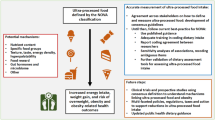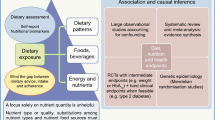Abstract
Metabolic syndrome is a risk factor for cardiovascular diseases and has become increasingly common in Japan. Epidemiological studies show inverse associations between intake of whole wheat grains and metabolic syndrome, but few dietary intervention trials have investigated the effect of whole wheat grain consumption. It was investigated whether a diet in which refined wheat bread (RW diet) was substituted by whole grain wheat bread (WW diet) would reduce visceral fat obesity in Japanese subjects. A randomized double-blind placebo-controlled intervention study was conducted in 50 Japanese subjects with body mass index (BMI) ≥ 23 kg/m2. Subjects were randomly assigned WW (WW group) or RW diets (RW group) for 12 weeks. Blood samples and computed tomography scans were obtained every 6th week. The WW group showed decrease (−4 cm2) in visceral fat area (VFA) (p < 0.05), whereas the RW group showed no significant changes. These time-dependent changes were significantly different between the groups. WW diet led to significant and safe reductions in VFA in subjects with BMI ≥ 23 kg/m2. WW diet may contribute to preventing visceral fat obesity.


Similar content being viewed by others
Abbreviations
- BMI:
-
body mass index
- HbA1c:
-
glycated hemoglobin
- HDL:
-
high-density lipoprotein
- LDL:
-
low-density lipoprotein
- SE:
-
standard error
- VFA:
-
visceral fat area
References
Outline for the Results of the National Health and Nutrition Survey Japan (2007) http://www0.nih.go.jp/eiken/english/research/pdf/nhns2007.pdf Accessed March 2016
McKeown NM, Yoshida M, Shea MK et al (2009) Whole-grain intake and cereal fiber are associated with lower abdominal adiposity in older adults. J Nutr 139:1950–1955. https://doi.org/10.3945/jn.108.103762
Roager HM, Vogt JK, Kristensen M et al. (2017) Whole grain-rich diet reduces body weight and systemic low-grade inflammation without inducing major changes of the gut microbiome: a randomised cross-over trial. Gut. Nov 1. Pii: gutjnl-2017-314786. doi:https://doi.org/10.1136/gutjnl-2017-314786.
Kristensen M, Pelletier X, Ross AB et al. (2017) A high rate of non-compliance confounds the study of whole grains and weight maintenance in a randomised intervention trial- the case for greater use of dietary biomarkers in nutrition intervention studies. Nutrients 9(1):55. doi:https://doi.org/10.3390/nu9010055
Kirwan JP, Malin SK, Scelsi AR et al (2016) A whole-grain diet reduces cardiovascular risk factors in overweight and obese adults: a randomized controlled trial. J Nutr. 146(11):2244–2251
Karl JP, Meydani M, Barnett JB, Vanegas SM, Goldin B, Kane A, Rasmussen H, Saltzman E, Vangay P, Knights D, Chen CYO, Das SK, Jonnalagadda SS, Meydani SN, Roberts SB (2017) Substituting whole grains for refined grains in a 6-wk randomized trial favorably affects energy-balance metrics in healthy men and postmenopausal women. Am J Clin Nutr 105(3):589–599. https://doi.org/10.3945/ajcn.116.139683
Vuholm S, Nielsen DS, Iversen KN, Suhr J, Westermann P, Krych L, Andersen JR, Kristensen M (2017) Whole-grain rye and wheat affect some markers of gut health without altering the fecal microbiota in healthy overweight adults: a 6-week randomized trial. J Nutr 147(11):2067–2075. https://doi.org/10.3945/jn.117.250647.
Ampatzoglou A, Atwal KK, Maidens CM, Williams CL, Ross AB, Thielecke F, Jonnalagadda SS, Kennedy OB, Yaqoob P (2015) Increased whole grain consumption does not affect blood biochemistry, body composition, or gut microbiology in healthy, low-habitual whole grain consumers. J Nutr 145(2):215–221. https://doi.org/10.3945/jn.114.202176
Vitaglione P, Mennella I, Ferracane R, Rivellese AA, Giacco R, Ercolini D, Gibbons SM, la Storia A, Gilbert JA, Jonnalagadda S, Thielecke F, Gallo MA, Scalfi L, Fogliano V (2015) Whole-grain wheat consumption reduces inflammation in a randomized controlled trial on overweight and obese subjects with unhealthy dietary and lifestyle behaviors: role of polyphenols bound to cereal dietary fiber. Am J Clin Nutr 101(2):251–261. https://doi.org/10.3945/ajcn.114.088120
Hajihashemi P, Azadbakht L, Hashemipor M, Kelishadi R, Esmaillzadeh A (2014) Whole-grain intake favorably affects markers of systemic inflammation in obese children: a randomized controlled crossover clinical trial. Mol Nutr Food Res 58(6):1301–1308. https://doi.org/10.1002/mnfr.201300582
Harris Jackson K, West SG, Vanden Heuvel JP et al (2014) Effects of whole and refined grains in a weight-loss diet on markers of metabolic syndrome in individuals with increased waist circumference: a randomized controlled-feeding trial. Am J Clin Nutr 100(2):577–586. https://doi.org/10.3945/ajcn.113.078048
Hlebowicz J, Wickenberg J, Fahlström R, Björgell O, Almér LO, Darwiche G (2007) Effect of commercial breakfast fibre cereals compared with corn flakes on postprandial blood glucose, gastric emptying and satiety in healthy subjects: a randomized blinded crossover trial. Nutr J 6:22. https://doi.org/10.1186/1475-2891-6-22
Funding
The authors are grateful to CPCC Co., Ltd. for planning and analytical support. The study was supported by a Research Project on Development of Agricultural Products and Food with Health-promoting Benefits awarded by NARO, Japan (Grant No, A-2). Authors KY, NS, MM, YS, and FS are employees of Nisshin Seifun Group Inc.
Author information
Authors and Affiliations
Corresponding author
Ethics declarations
Conflict of Interest
The other authors YT, and AS declare that they have no conflict of interest.
Electronic supplementary material
ESM 1
(DOCX 35.6 kb)
Rights and permissions
About this article
Cite this article
Kikuchi, Y., Nozaki, S., Makita, M. et al. Effects of Whole Grain Wheat Bread on Visceral Fat Obesity in Japanese Subjects: A Randomized Double-Blind Study. Plant Foods Hum Nutr 73, 161–165 (2018). https://doi.org/10.1007/s11130-018-0666-1
Published:
Issue Date:
DOI: https://doi.org/10.1007/s11130-018-0666-1




